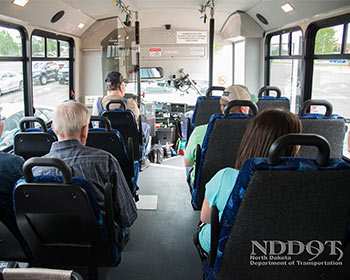UGPTI's Small Urban and Rural Center on Mobility Works to Improve Mobility in Bakken
Posted: Mar 10, 2022
 Photo Credit: NDDOTFor most people, mobility is as simple as climbing into a car or truck and turning the key; but for a significant number of individuals, even in the Bakken region, public transportation, ride sharing, taxis, and other forms of transportation are a critical link to work, recreation, shopping, and medical care.
Photo Credit: NDDOTFor most people, mobility is as simple as climbing into a car or truck and turning the key; but for a significant number of individuals, even in the Bakken region, public transportation, ride sharing, taxis, and other forms of transportation are a critical link to work, recreation, shopping, and medical care.
For more than 20 years, experts at the Upper Great Plains Transportation Institute have been working to improve mobility for individuals across the state and nation. Studies conducted by researchers in the institute's Small Urban and Rural Center on Mobility (SURCOM) help guide decisions by transit agencies and public policy makers. The center's training programs provide opportunities for transit managers, drivers, and other employees to enhance their knowledge and improve their skills.
"Our goal is to conduct work that helps extend mobility options to those that need them and do so in ways that enhance the livability of communities," notes Jill Hough, SURCOM's director. Past research has included a study of the impact of oil boom and bust cycles on transit in western North Dakota. Another study specifically examined the impact of the most current oil boom on mobility needs and implications for livability in western North Dakota cities.
SURCOM researchers are currently conducting several studies that may have implications for the Bakken region.
- Researchers are examining travel behavior and mobility of transportation-disadvantaged groups, such as older adults, people with disabilities, individuals in low-income households, and those living in rural areas. They are analyzing data from the National Household Travel Survey, conducted by the Federal Highway Administration, which analyzes trends in personal and household travel. Understanding trends in the travel behavior of transportation-disadvantaged populations in rural areas is important for understanding how well the mobility needs of these populations are being met and for informing policy and transportation investment decisions. The research could also help show the extent to which emerging transportation options, such as transportation network companies, are meeting the mobility needs of these populations.
- Shared-use mobility services, such as ride-sourcing, bike-sharing, and car-sharing, have been introduced in a few rural communities and a growing number of small urban communities. Researchers will analyze the interest and willingness to adopt various technologies and innovative transportation services by different demographic groups, and how they can be used to help effectively meet the mobility needs of residents in rural and small-urban communities. The research will guide planning for appropriate shared mobility services to meet the transportation needs in rural and small urban communities. Dickinson is one of the case-study locations for the study.
- To help increase food access for transit-dependent populations affected by COVID-19 hardships, some transit agency providers have connected with local organizations to deliver food and minimize non-essential travel. SURCOM researchers are identifying transit agencies' roles in the following: reducing food deserts (areas with limited access to affordable and nutritious food) and increasing food access in rural and small urban areas of the United States; identifying transit agencies' abilities for food delivery to customers' homes; measuring the transit agencies' willingness to collaborate with food banks in their areas; and documenting best practices of rural transit agencies participating in reducing food deserts in the United States.
- Staff with UGPTI and SURCOM are also working with the North Dakota Department of Transportation to complete an inventory of all transit vehicles and facilities across the state. The inventory is required by the Federal Transit Administration to assure federal dollars allocated to local transit agencies are spent as intended and to assure that vehicles and facilities are being maintained and meeting federal standards for safety and accessibility. "Our participation in this effort builds on our long-standing relationships with transit operators and gives us an opportunity to have an up-close view of the status of the state's transit fleet," Hough says.
SURCOM also has an extensive training program designed to help transit agency staff increase their knowledge and skills. Training topics include:
- Business continuity and crisis management
- Emergency management
- Ethics in the workplace
- Financial management for transit operators
- Hiring and retaining transit Employees
- Human resources
- Intelligent transportation systems
- Performance management
- Safety and risk management
- Strategic management
- Working with local governments
"Many of the staff in transit agencies do not come from a transit or management background, but they are innovative and motivated," Hough explains. "Our training helps them improve skills specific to their work and shows them how to find and establish benchmarks to measure and improve their performance."
For more on SURCOM's efforts, go to www.ugpti.org/surcom/

